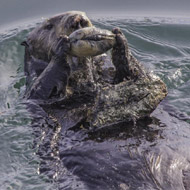
Study find sea otters may have been using tools for thousand of years
A study by US researchers has revealed that tool use by sea otters is universal and has little to do with family connections.
Previous research found that a group of tool-using dolphins in the Indio-Pacific shared a common genetic lineage.
But a new paper, published in Biology Letters, suggests that tool-using sea otters are not necessarily related.
“Sea otters and bottlenose dolphins both use tools and they are ecologically similar, so we thought they might have a similar genetic pattern,” said Katherine Ralls, lead author of the paper and scientist at the Smithsonian Conservation and Research centre, Virginia.
“Surprisingly, what we discovered is that sea otters that most frequently use tools are no more related to each other than to the population as a whole.”
Although not all individuals in a population use tools, sea otters often use tools like rocks or other hard objects to crack into their meals.
In the study, scientists observed individual otters using tools for at least 40 per cent of captured prey. They also analysed the genetic information collected from individual sea otters on the coast of California between 2000 and 2014.
“DNA analysis is critical to understanding our natural world and our world’s natural history, in this case helping us to get a better grasp on the little-known world of tool use in marine animals,” said co-author Nancy Rotzel McInerney.
According to the study’s authors, the difference between sea otters and dolphins might be how long the species has used tools.
It is thought that dolphins began utilising rocks, snails and crabs some 200 years ago. But researchers believe sea otters may have started using tools many thousands, or even millions, of years ago.
The team now aims to confirm how long they have been using tools by examining fossil sea otters for physical indicators of tool use.
Image (C) Jessica Fujii/Monterey Bay Aquarium



 The BSAVA has opened submissions for the BSAVA Clinical Research Abstracts 2026.
The BSAVA has opened submissions for the BSAVA Clinical Research Abstracts 2026.